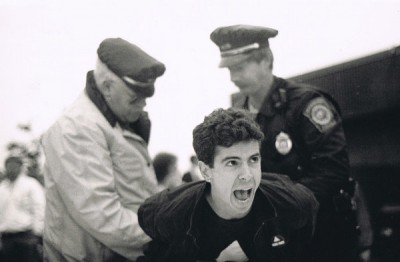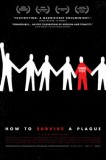| Reviews & Columns |
|
Reviews DVD TV on DVD Blu-ray 4K UHD International DVDs In Theaters Reviews by Studio Video Games Features Collector Series DVDs Easter Egg Database Interviews DVD Talk Radio Feature Articles Columns Anime Talk DVD Savant Horror DVDs The M.O.D. Squad Art House HD Talk Silent DVD
|
DVD Talk Forum |
|
|
| Resources |
|
DVD Price Search Customer Service #'s RCE Info Links |
|
Columns
|
|
|
How to Survive a Plague

The opening titles of David France's powerful new documentary How to Survive a Plague set the scene as follows: "Year six of the AIDS epidemic. Greenwich Village, New York. The epicenter." That's just a few words, but they're carefully chosen--they convey information, yes, but also the urgency of the moment. People were dying, by the hundreds, and were being ignored by a government that would not speak the disease's name, much less make a priority of finding a cure. In New York City, a group of activists decided that they weren't having it, and that's how ACT UP was born.
How to Survive a Plague is an effective and evocative hybrid of history and experience, aiming both to parachute the viewer into the middle of the action and to place it in a context. The group's early "actions" were aimed at local targets--we first see their protest at City Hall, to call out Mayor Koch's utter dismissal of the crisis, followed by a "kiss-in" at St. Vincent's Hospital, which had refused and abused gay patients. But soon they were taking on bigger targets, with a giant protest at the National Institute of Health that eventually turned violent (in front of TV cameras; the footage is chilling).
As activists were marching, chanting, and sitting in, other members of the organization became experts in the science of potential treatments--they "had to become scientists," partly to more effectively argue their points and policies, partly out of self-preservation. These two parallel tracks would eventually split off entirely, with ACT-UP's scientific faction becoming their own entity, TAG.
France wisely focuses on a few key figures in the movement: Peter Staley, Mark Herrington, Derek Link, Gregg Bordowitz, Bob Rafsky, David Barr, and Larry Kramer, whose explosive, impassioned (and ultimately fruitless) plea for group unity provides one of the film's most remarkably astute moments. Many of the others are courtesy of Stanley, whose appearance on CNN's Crossfire does not go in the direction you'd expect (considering Pat Buchanan is on the panel), and whose speech at the 1990 International AIDS Conference still raises goosebumps.
The picture serves several functions. It is instructive: former network news producer Ann Northrop is seen advising the group on how to effectively speak in sound bites. It is infuriating: the business with the Catholic cardinals and New York's bishop is utterly confounding, and you can always rely on good ol' Jesse Helms to provide some blood-boiling bigotry. (This viewer was not aware of the group's unsheathing of a condom over his Virginia home, and to that I say, somewhat belatedly, bravo.) And it inspires: Rafsky speaks at the "political funeral" for activist Mark Fisher at Bush's 1992 New York headquarters, and his words ("Mark's spirit will haunt you until the end of your days, so that in the moment of your defeat, you will remember our defeats, and in the moment of your death, you will remember our deaths") are bitter, eloquent, and unspeakably powerful.
France and editors Todd Woody Richman and Tyler H. Walk clearly relish the reconstruction of those protests and action, using razor cutting and Stuart Bogie's driving score to create a you-are-there immediacy. They only make one real misstep: in the opening minutes of the film, I was rather excited by their apparent resistance to use current, retrospective talking-head interviews; there's so much good material (over 700 hours of tape, apparently, courtesy of 30 credited videographers) that they seemed to have chosen to tell the story in the present rather than past tense. Then a contemporary interview pops up at the 13-minute mark, and my heart sank a bit. Those recollections are valuable, sure, but they're used so sparingly throughout the film that it would have been stronger without them--and would have rendered one of the picture's more affecting moments (the reveal of those who survived) all the more emotional.
That's a minor complaint, though, a wish for perfection from a documentary that is, in its current state, awfully damn good. How to Survive a Plague is an important, angry film--and as its closing text makes clear, it is anything but distant history.
Jason lives in New York. He holds an MA in Cultural Reporting and Criticism from NYU.
|
| Popular Reviews |
| Sponsored Links |
|
|
| Sponsored Links |
|
|
| Release List | Reviews | Shop | Newsletter | Forum | DVD Giveaways | Blu-Ray | Advertise |
|
Copyright 2024 DVDTalk.com All Rights Reserved. Legal Info, Privacy Policy, Terms of Use,
Manage Preferences,
Your Privacy Choices | |||||||











